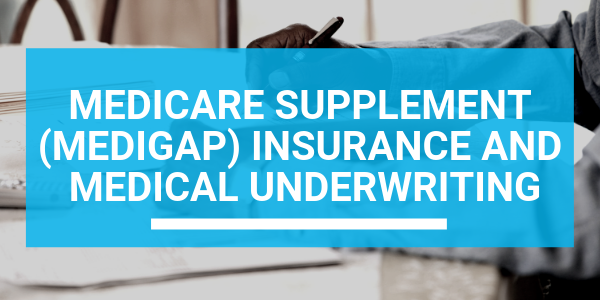Medigap underwriting will determine if you are approved on a Medigap plan or not. If you haven’t enrolled in a Medigap plan (Medicare Supplement) during your Initial Enrollment Period (When is Medigap open enrollment?), during a Guaranteed Issue Period (When is a Medicare Supplement Guaranteed Issue?), or during your Birthday Rule (only available in some states – Medigap birthday rule states), your acceptance will not automatically be approved. It first must go through a medical underwriting process. This is when the underwriter assigned to your case will make a decision based upon your health status, prior medical history and any upcoming planned treatment or surgeries. Each insurance company uses their own set of Medigap underwriting guidelines. Even the application questions may vary widely. In addition, underwriters must go through rigorous training to become proficient at what they do. They must be experienced in the field of medical terminology and knowledgeable regarding pharmaceutical drugs and medications that the prospective applicants take.
Initial Enrollment Period (When is Medigap open enrollment?), during a Guaranteed Issue Period (When is a Medicare Supplement Guaranteed Issue?), or during your Birthday Rule (only available in some states – Medigap birthday rule states), your acceptance will not automatically be approved. It first must go through a medical underwriting process. This is when the underwriter assigned to your case will make a decision based upon your health status, prior medical history and any upcoming planned treatment or surgeries. Each insurance company uses their own set of Medigap underwriting guidelines. Even the application questions may vary widely. In addition, underwriters must go through rigorous training to become proficient at what they do. They must be experienced in the field of medical terminology and knowledgeable regarding pharmaceutical drugs and medications that the prospective applicants take.
Below are three categories of situations/results of Medigap underwriting on Medigap plans:
Medigap Underwriting: Very Unlikely to be Approved (or Possibly Will Be Immediately Declined)
The underwriter can decline an applicant based on one or more responses to questions on the application. Questions such as, “At any time, have you been medically diagnosed, treated or had surgery for any of the following: congestive heart failure, defibrillator, leukemia, Parkinson’s Disease, Alzheimer’s Disease, dementia, multiple sclerosis, chronic kidney disease or organ transplant?” There are several other conditions in this category, but for sake of brevity here, only some of these are listed. To see all conditions, you would have to refer to specifically to the application itself (which is different with different insurance companies). If you answered “Yes” to any of these questions, you would be immediately declined and not permitted to complete the application process. Some applications may say “Have you ever, instead of “At any time”, but this does not change how you would answer the question.
To give you an idea of what I mean, let’s say Betty Blue wants to enroll in a Medigap Plan G, with ABC Insurance Company. On the application, when she gets to the section on “At any time (or have you ever), she notes that one of the conditions she has is among those on the list. She stops and cannot proceed with the application.
Another reason to be declined would be because of one or more of the medications you currently take. If you are taking one or more medications that are on the insurance company’s “declinable drug list”, your application will likely be declined right away. Each company has their own declinable list, so it is worthwhile to evaluate your options before accepting for sure that companies will decline you. If you use a broker (Why You Should Use a Broker), he/she can help you navigate this process. He/she will be able to call the specific insurance company to ask if a certain drug is declinable or actually has that list at hand to find out, before you spend any time going through the application process.
A hypothetical illustration would be if Jim Smith wants to enroll in Medigap Plan N with Sunshine Insurance Company. He currently takes Eliquis to prevent strokes, as well as using insulin for Type 1 diabetes. He fills out the application but is declined because he takes a blood thinner and insulin for Type 1 diabetes. Sometimes, applications are declined based on the the combination of drugs you are taking.
Some insurance companies have stricter guidelines as far as which drugs you are taking for which diseases/conditions and how many of each type of drug you are on. One company may allow three high blood pressure medications and two diabetes medications. However, another company may only accept two high blood pressure medications with one diabetes medication (see below under #2 for another example).
Medigap Underwriting: Approval Depends on your Medical Records and on the Insurance Company
There is not one strict rule across the board for insurance companies to base their decisions on as far as Medigap underwriting goes. Each company uses their own criteria to approve or decline an applicant. That said, there is generally a 2-3 year “lookback” on the applications for certain conditions or procedures, i.e. heart procedures, stroke, lung problems requiring the use of oxygen, neuropathy, etc. It depends on whether you are currently being treated for one or more of these conditions, or when your last treatment occurred and when you were medically released by your provider.
An example would be that Angie Taylor underwent cardiac ablation caused by atrial fibrillation, 2-1/2 years ago, and was hospitalized for 1 day. She applies for Medigap Plan G with Good Health Insurance Company, but she’s declined as they have a 36-month lookback policy. She would need to wait 6 more months before she can re-apply. Angie doesn’t want to wait and subsequently completes an application with Winstar Insurance Company. She is approved since Winstar only has a two-year lookback policy.
Here’s a different scenario but still the same outcome: Joe has high blood pressure along with Type 2 diabetes but is not on insulin. He’s been taking his medications for more than 2 years. He applies to POP Insurance Company and is approved. Whereas, Jane applies to the same company and has high blood pressure along with Type 2 diabetes, but also takes insulin. She is declined. Again, the criteria is different with each company – some approve if taking insulin, some decline and some companies will not decline you with insulin but the amount you take daily must be under a certain amount.
Should Not Have a Problem Being Approved
This category is the easiest and quickest for the medical underwriter to decide upon. If you are on maintenance type medications or take no medications at all, you will most likely be approved.
Hypothetical Illustration 1: John Green applies to Happy Insurance Company; he currently takes one medication for high blood pressure and two medications for cholesterol. He is approved. The medications John takes are considered “maintenance medications”. In other words, a medication to keep a long-term condition stabilized.
Hypothetical Illustration 2: Nancy Best wants to enroll in a Medigap Plan N with Sowhat Insurance Company. She takes no medications except for some over-the-counter vitamins and supplements. She is approved by the insurance company.
Important Disclaimer: Each insurance company has different guidelines for underwriting including which conditions and/or which medications they will decline. They may also take into consideration when a person started taking a certain drug and the length of time they have been on that drug. The more stable someone is on a medication, the more likely they will be approved.
_____________________
65Medicare.org is a leading, independent Medicare insurance agency for people turning 65 and going on Medicare.  If you have any questions about this information, you can contact us online or call us at 877.506.3378.
If you have any questions about this information, you can contact us online or call us at 877.506.3378.

Leave a Reply
You must be logged in to post a comment.